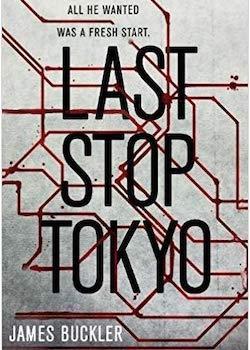Last Stop Tokyo

By James Buckler
Doubleday, 2017
ISBN-13: 978-0857524973
Review by Trevor Skingle
James Buckler’s debut novel Last Stop Tokyo follows Alex Malloy who escapes to Japan to get away from the disgrace that he feels as a result of a deeply traumatic family incident involving his outwardly respectable brother over which he tries to exert some control with tragic consequences. He gets a job in Tokyo teaching English and, as a result of his naiveté and his initially trusting nature, finds himself through his relationship with his girlfriend, the perplexing, manipulative and self-serving Naoko Yamamoto. Alex ends up being drawn deeper and deeper into increasingly complex, difficult and ultimately dangerous and deadly circumstances, which seem to revolve – to a greater and lesser degree throughout the book – around the commercial art gallery sector.
The two main characters, Alex and Naoko, are quite rightfully well-developed though it was difficult to imagine two of the other key characters, Jun the Yakuza henchman and Megumi the twisted psychopathic gallery associate of Naoko, as multi-faceted and three dimensional. They deserved much more character development as did other seemingly pivotal figures in the plot such as Alex’s friend Hiro, the Police Officers Inspector Saito and his assistant Officer Tomada, and Alex’s parents, especially his mother.
Occasionally Japanese phrases are included but not translated, and there is a visit to the popular Tokyo resort town of Karuizawa which is accompanied with only a superficial description of the resort, an approach which is also applied to other locations. It would have improved the story somewhat had brief translations of the phrases been provided and more intimate location descriptions been included for fans of this oeuvre who perhaps haven’t visited Japan and aren’t familiar with the country and the language – a lesson which could perhaps have been learnt from the insightful style of writing in translation in the anthology Tokyo Stories: A Literary Stroll (University of California Press, 2002).
Though a violent thriller, the lack of serious menace of the first two thirds of the story is made up for by the twists and turns in the main plot which holds together numerous inter-related sub plots which fortunately don’t become so complex that it is difficult for the reader to follow the general tenor of the main story. The flashbacks to the circumstances surrounding Alex’s escape from his family situation back home are handled well as is that of his seemingly inescapable descent into the seedy underbelly of the world of the criminal fraternity in Japan. Some of the unexpected plot twists do leave the reader trying to second guess what to expect, the hallmark of a reasonably good thriller.
Though Buckler’s debut novel takes a while to pick up the pace when it does it makes for an interesting if not gripping read. Quite where it fits into the genre’s output isn’t clear; not the in the same easy reading category as Fran Pickering’s Josie Clark sleuth thrillers (The Tokyo Karaoke Murder, The Cherry Blossom Murder, The Haiku Murder, The Bullet Train Murder) but also not in the same deeply disturbing category as Natsuo Kirino’s innovatively gruesome intrigues (Out, Grotesque, Real World). Perhaps somewhere in the middle. Not particularly a ‘can’t put it down’ but more of a ‘savour it at regular intervals’ book.
In a predominantly crimeless Japan it is interesting that crime novels have become such a popular read yet it doesn’t quite feel like Buckler has managed to get under the skin of the Japanese and the Yakuza, and captured the way that they interact with each other and, potentially, with foreigners in the way that other writers of thrillers located in Japan, especially native Japanese authors, do so well. Consequently, though Buckler obviously knows Japan having worked there as a teacher (1), as a debut thriller it feels a little clichéd and as such could really have been located in any major city in the world. This is not the Tokyo that most seasoned visitors and foreign residents know and love.. This is a Tokyo of the imagination, a darker shade of a somewhat brighter city that the reader should only take seriously for the purposes of Buckler’s story.
In summary as his debut novel Last Stop Tokyo could be regarded with some leeway as a ‘bedding in’ publication by a novice author, something which isn’t limited to Buckler; there having been some pretty dismal attempts at English language serial crime novels located in Japan that leave an awful lot to be desired. However that being said what definitely does come across is that there is a glimmer with Last Stop Tokyo of future promise and that with further work on character and plot development, a little stylistic tweaking and a tighter plot line that future novels in this genre by Buckler will hit much closer to the target.
(1) James Buckler grew up in the South West of England and currently lives in London. He spent some time as an English teacher in Japan. He studied film at the University of Westminster and worked in film and TV for many years, most notably as a post-production specialist for MTV and BBC Films.

